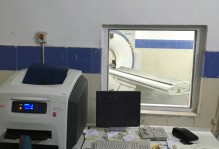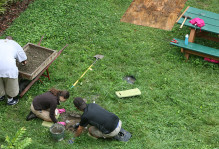What (and Who) College Has Helped Me Become
Sometimes I miss high school Morgan. She didn’t have to “become” something—she could just be. And what she did was “be” curious. She asked any question that tugged on the corner of her brain and followed where it led, the same way a little girl in a butterfly pavilion steps gingerly behind a pair of brightly-colored wings.
Bose-Einstein Condensates were one such curious tug on my thoughts. They caught my attention in the clickbait title of an obscure online science blog when I was a junior in high school. I often go through “research phases” where I sacrifice all my free time on the altar of mastering some niche interest, and I had just tired of snowflakes and exhausted the meager supply of articles available to me on Third Culture Kid psychology when I encountered an article entitled “Scientists Discover Object with Negative Mass.”
A casual blogger’s cheap (though clearly effective) attempt at baiting science enthusiasts introduced me to Bose-Einstein Condensates (BECs) for the first time. They were everything I love in a new interest— mysterious and elusive and just out of comprehension’s reach for a physics novice, they had thoroughly captivated me and I wanted to understand them more than anything. Unsatisfied with the handful of blog posts that seemed to be the only resources at my physics reading level, I eventually cornered my physics teacher and presented him with a catechism of questions. He admitted he didn’t know how they worked, or their scientific significance, or how come they can only be created with certain elements, but he offered me the contact information of a university professor whose research involved creating them in a laboratory. I promptly sent off an email to Dr. Aubin at William & Mary, who today is my senior research advisor.
Condensates are the first topic in “real” physics that I discovered independently and followed outside of the classroom. As a high schooler, I could really only understand what I read about strange phenomena associated with BECs, and little-to-nothing about the actual physics behind them, but I was fascinated nonetheless. I knew, for example, that they are comprised of supercooled atoms, but not that they need to be cooled almost to absolute zero (0 Kelvin) or about the intricacy of the complex lens system that focuses a laser down in order to cool them (actually, and for this I blame Hollywood, I thought that lasers could only create heat). I knew they exhibited “quantum properties,” but not what these properties were, or how something so much larger than an elementary particle (such as an electron, or the quarks which make up protons and neutrons) could even possess quantum properties. I didn’t understand the “quantum scale” to begin with. When did “classical” end and “quantum” begin? I didn’t learn the answers to these questions, and the little tug of curiosity was left unsatisfied. Eventually it waned and stopped pestering me, I forgot about my questions, my life stage shifted, and I came to college.
Here, I am supposed to “become” something. People want to know what my major is not so that they can find out what I’m interested in or who I am now, but what I will be later— who I will be later in life, after I graduate. I’ve been told so many times that college, my education, my opportunities, my internships are all about investing in who I will become, but at the same time that I “have time” and I’ll “figure it out” and I “don’t need to worry” because college is the best four years of my life and I really should be out enjoying myself.
So many people ask me what I want to be and do but no one has ever told me how to figure that out, and sophomore year this completely overwhelmed me.
I called my dad to tell him I didn’t feel like I was becoming anything. Who was I becoming? Someone who knew how to cram a semester’s worth of complicated math into a single memory-intensive test? Someone who cried over problem sets that my entire class lost sleep over and skipped meals to complete, only to be served a new one (longer than the last) on the day the first was due?
“Dad, I don’t feel like I’m becoming anyone. I’m not figuring out what I love, or what I’m good at. All I’m learning, over and over, is what I can’t do and what I’m not good at and what I’ll never understand.”
Ever-gentle and reassuring, he told me I have time, I’ll figure it out, and I don’t need to worry. After all, college is teaching me how to “become.” I didn’t believe him, but I should have.
The next semester, I took my first quantum mechanics class, and there was not a lesson that didn’t captivate me. My curiosity, disconcertingly silent the previous year, tugged me in so many directions as I hopped from office hours to Zoom calls to found-online papers to new books. That class taught me a new language with which to ask questions, the only thing I’ve ever found language useful for, and gave me new tools for seeking answers.
I took another quantum mechanics class the next semester, and there I learned that the topics that had excited me so much were intimately related to the physics behind Bose-Einstein Condensates. In fact, I found out that nearly every single one of my favorite topics from previous physics and math classes had a bit of quantum mechanics in common.
Now I know that lasers can cool because they’re exceptionally “ordered,” whereas heat is created from disorder, and related to kinetic energy. I know that BECs’ quantum properties come from their behavior as both particle and wave, much like light, and that this is useful because they’re much larger than a single photon and can be studied much more easily. How are they able to be so much larger? They’re composed of atoms that are bosons, a category name given to particles based on their spin classification. Bosons, particles with integer spin, like to be in the same energy state, which means that when supercooled, they all exist in the lowest energy state available. Sharing the same energy level makes identical particles indistinguishable from one another (indistinguishability is a quantum property, since quantum particles(waves?) have ill-defined spatial locations) and act as one super-atom.
For the first time, I had something in physics that I was fully confident in, and it had nothing to do with my abilities or my accomplishments. I’m not the very best physics student, I’m not the very best at math, and I don’t have the single highest GPA or the most impressive resume. I just love quantum mechanics, and this confidence in a single affection has given me more direction and self-confidence in my future career than anything else.
I don’t know “what” I’ll be, I just know what I want a small part of it to include, and I’m starting to understand how those two coincide.
While certainly privileged with opportunities to follow my curiosity, I don’t believe I’m exceptionally lucky to have had my interests and my classes align for me the way they did: I’ve seen this to be true for a lot of people close to me, even in other majors. Most of the graduate-school-bound physics majors have a single topic that interested us first. The soft-spoken brunette who sat next to me in intro physics freshman year loved our optics lesson and is now working in a quantum optics lab and applying to universities with specialized schools of optics. The girl in my sophomore study group who dared to wear green lipstick always said she likes physics but needs to work with her hands. Now, she’s looking into applied physics and engineering. My best friend and roommate, who once cried because of how beautiful she found photosynthesis, is now in a botany lab, worked in the greenhouse for a year, and is preparing to study plant genetics and ecology for her Ph.D.
Right now, it’s easy to see where my high school curiosity was directing me. My curiosity led me to my high school teacher, who pointed me to Dr. Aubin, who offered me a position in his lab four years later and helped me choose my classes, which helped me get two internships, which led me back to Dr. Aubin’s office where we discussed graduate school options.
In the same office where he received my first email, he asked me what direction I want to look for grad school, and I answered confidently for the first time about what I’m looking for in my future, because I knew what physics I love.
Comments are currently closed. Comments are closed on all posts older than one year, and for those in our archive.




This article is incredibly well written. It evokes beautiful imagery as I read it and communicates a message I, as a sophomore, needed to hear. Thanks for sharing!